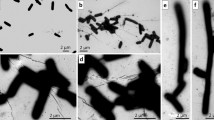Abstract
FEW compounds are known to sensitize living organisms to the lethal effects of ionizing radiation. Since those that do include oxygen1 and nitric oxide2,3, both of which are stable free radicals, it was considered of interest to see if certain substituted nitroxides4, which are water-soluble stable free radicals, would exhibit similar properties.
This is a preview of subscription content, access via your institution
Access options
Subscribe to this journal
Receive 51 print issues and online access
$199.00 per year
only $3.90 per issue
Buy this article
- Purchase on Springer Link
- Instant access to full article PDF
Prices may be subject to local taxes which are calculated during checkout
Similar content being viewed by others
References
Hollaender, A., Stapleton, G. E., and Martin, G. L., Nature, 167, 103 (1951).
Howard-Flanders, Paul, Advances in Biological and Medical Physics, 6, 553 (Academic Press, New York, 1958).
Dale, W. M., Davies, J. V., and Russel, C., Intern. J. Rad. Biol., 4, 1 (1961).
Hoffmann, A. K., and Henderson, A. T., J. Amer. Chem. Soc., 83, 4671 (1961).
Author information
Authors and Affiliations
Rights and permissions
About this article
Cite this article
EMMERSON, P., HOWARD-FLANDERS, P. Sensitization of Anoxic Bacteria to X-rays by Di-t-butyl Nitroxide and Analogues. Nature 204, 1005–1006 (1964). https://doi.org/10.1038/2041005a0
Issue Date:
DOI: https://doi.org/10.1038/2041005a0
This article is cited by
-
New aryl-tert-alkylnitroxyls
Bulletin of the Academy of Sciences of the USSR Division of Chemical Science (1975)
-
Radiosensitization of Escherichia coli by Methyl Hydrazine and the Effect of Oxygen
Nature (1967)
Comments
By submitting a comment you agree to abide by our Terms and Community Guidelines. If you find something abusive or that does not comply with our terms or guidelines please flag it as inappropriate.



